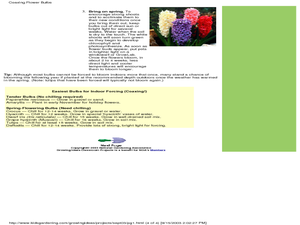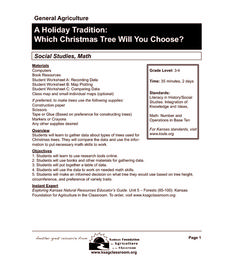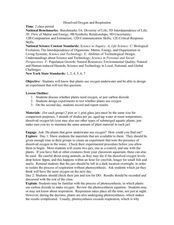Kenan Fellows
Terrarium in a Bottle: Modeling the Atmosphere, Greenhouse Effect, and Water Cycle
You've heard of farm to table ... but what about farm in classroom? Junior agriculturalists embark upon a two-week journey into the science of growing things. Based upon the classic terrarium in a two-liter experiment, the instructional...
Baylor College
Needs of Plants
What better way to learn about plant life than by creating a class garden? Young botanists start with a brief discussion about radishes before planting seeds and watching them grow. To determine the importance of water, sunlight, and...
Berkshire Museum
The Three Life-Giving Sisters: Plant Cultivation and Mohican Innovation
Children gain first-hand experience with Native American agriculture while investigating the life cycle of plants with this engaging experiment. Focusing on what the natives called the Three Sisters - corn, beans, and squash - young...
Baylor College
Do Plants Need Light?
Turn your classroom into a greenhouse with a lesson plan on plant growth. First, investigate the different parts of seeds, identifying the seed coat, cotyledon, and embryo. Then plant the seeds and watch them grow! Measure the new plants...
Baylor College
Needs of Living Things: Pre-Assessment
Determine your class's prior knowledge about the necessities of life with this pre-assessment for a unit on living things. Learners draw pictures of themselves with all the things they need to live, grow, and survive. These drawings will...
Curated OER
Coaxing Flower Bulbs
Students complete an experiment for coaxing flower bulbs into growth. In this flower growth instructional activity, students research various types of flower bulbs that may be used to complete a coaxing experiment. Students then complete...
University of Minnesota
Mirroring Emotions
Do you ever give your class the "teacher look"? Without saying a word, they become silent and engaged (hopefully). How do they know what you're thinking? Explore the concept of nonverbal communication and how it relates to our mirror...
Curated OER
Plankton in the Air
Here is a lab activity adequate for use with any full lesson on environmental factors that shape animal adaptations or marine animal characteristics. Pupils will discuss the role plankton plays in the environment and filter-feeding...
Curated OER
The Dirt on Plants
Students draw and label the four parts of a plant. They describe changes that are part of the common life cycle. Students follow various one and two step directions. They are asked to discuss that they can recall about plants.
Virginia Department of Education
Weather Patterns and Seasonal Changes
Get your class outside to observe their surroundings with a lesson plan highlighting weather patterns and seasonal changes. First, learners take a weather walk to survey how the weather affects animals, people, plants, and trees during...
Curated OER
Life Cycle of Trees
Turn your students into young tree-tectives with this fun science investigation into the life of trees. To begin, a class volunteer gets dressed up in a tree costume as the different parts of trees are introduced. Then, the class learns...
Agriculture in the Classroom
A Holiday Tradition: Which Christmas Tree Will You Choose?
Different varieties of Christmas trees provide an interesting way to combine social studies, science, math, and technology. Class members not only research the history of the Christmas tree holiday tradition, they compare and contrast...
Curated OER
Forest In A Jar
Tenth graders are introduced to the process of succession and gain awareness of the changing nature of ecosystems. They demonstrate a comprehension of the dynamic nature of ecosystems, including the relationship between ecological...
Curated OER
Forget-Me-Knots in a Pot
Young scholars discuss Alaska's state flower and grow their own flowers in pots. They discover skills needed for gardening and plant care. Once students have researched the state flower, they draw pictures of forget-me-knots and list...
Curated OER
Farm Products Help Me Grow
Students view a display of empty food containers (or illustrations). They select a food and decide as a class if it has an animal or plant origin. Students view a display of common farm animals that are commonly eaten (cow, pig, chicken,...
Curated OER
Seed Socks
Students explore how seeds travel. In this seed disbursement instructional activity, students head outside in their bare socks. Students walk around then before going inside they take the socks off and examine what their socks picked up....
Curated OER
Teacher-Astronaut Offers New Lessons
Learners read about teacher-in-space Barbara Morgan and life in space. In this space science and current event lesson, the teacher introduces the article with a vocabulary activity, then students read the news piece and participate in a...
Alabama Learning Exchange
Make a Difference!
We are very dependent upon other life forms around us to survive. Here, scholars explore relationships in the ecosystem with the help of Auntie Litter and the pollution patrol. They imagine a world without grass, making connections to...
Curated OER
Farmers and the Food Connection
Learners investigate the process of growing food. In this agricultural activity, students invite a farmer into their classroom to discuss how they grow and process food. Learners participate in learning centers which focus on farming.
Curated OER
Secrets to Healthy Soil
Fourth graders explore needed mineral nutrients for healthy soil. In this soil lesson, 4th graders investigate how living and nonliving elements combine to contribute to fertile soil development.
Illustrative Mathematics
Grass Seedlings
Plants never grow at the same rate, and that is the antithesis for this word problem involving multiplication of fractions. On the worksheet, Raul notices that Pablo's seedlings are 1 1/2 times as tall, and Celina's seedlings are 3/4 as...
Curated OER
Dissolved Oxygen and Respiration
Students are presented with the question, "Do plants that grow underwater use oxygen?" They create an experiment to test the presence of dissolved oxygen in the water using provided materials. Student experiments include a control jar as...
Science 4 Inquiry
The Yin and Yang of Photosynthesis: Day vs. Night
Floating fragments of elodea can grow even without roots. Young scientists use eldoea plants to observe the oxygen production from photosynthesis. They study the difference between having access to high amounts of light and low amounts...
Curated OER
My Little Seed House
First graders chart the growth and development of seeds. In this seed growth lesson, 1st graders observe seeds as they mature through the growing process.

























